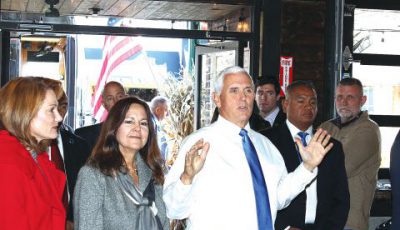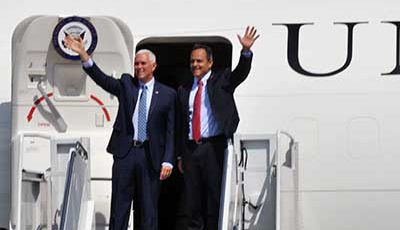Pence announces $167k grant for Grace Health
A special visit by United States Vice President Mike Pence to the region last week brought with it a lot more than media attention.

Vice President Mike Pence was joined on his visit to Kentucky by U.S. Rep. Hal Rogers and Gov. Matt Bevin.
The Vice President was in Manchester Thursday along with Gov. Matt Bevin, Congressman Hal Rogers and Health and Human Services Secretary Alex Azar to highlight the military’s Innovative Readiness Training (IRT) mission command center and Operation Coal Country, which has provided much-needed no-cost medical, dental and vision care to Knox County residents last week.
During his visit, the Vice President announced over $9 million in grants from the U.S. Department of Health and Human Services to assist in Kentucky’s fight against opioid epidemic plaguing the region. Of that $9 million, $167,000 went to Corbin-based Grace Health. “We need health care across rural areas of America maybe now more than ever, because we are in the midst of fighting the deadliest drug crisis in the history of this country,” said VP Pence, who went on to quote President Donald J. Trump, saying “we would do our best to… liberate our fellow Americans from the grip of drug addiction once and for all.”
In a statement from Grace Health, CEO Mike Stanley said “When VP Pence, Governor Bevin, and I were shaking hands, VP Pence said he was amazed at all the services that Grace Health provided. I shared with him how God has blessed Grace Health beyond my imagination. I thanked him for the grant funding to further our integrated behavioral health services to combat the opioid epidemic.”
The financial boost to Grace Health will be used to increased mental health/substance abuse disorder providers, staff and patient access, and according to the organization, the plan to hire a full-time Psychiatric Nurse Practitioner and a full-time Behavioral Health Care Manager within two to three months of receiving the funding.
The Vice President’s announcements come on the heal of a Washington Post investigation that revealed how out-of-control the opioid pill issue is in southeastern Kentucky.
The Washington Post’s database of information from the United States Drug Enforcement Administration revealed that from 2006-2012, 13,943,639 pain pills were prescribed in Knox County, that’s enough for 62 pain pills per person. Of those, the top five pharmacies filling opioid prescriptions during that time were Parkway Pharmacy – 3,298,960 pills, Hinkle Hometown Drug Store – 2,889,920 pills, Rite Aid – 1,848,620 pills, Knox Professional Pharmacy – 1,776,869 pills, and Walgreens – 1,376,100 pills. The top manufacturer of opioids sold in Knox County was Actavis Pharma Inc. with 9,711,400 pills. The top distributor of opioids to Knox County pharmacies was Smith Drug Company, with 4,046,050 pills.
According to Knox Professional Pharmacy co-owner Cory Smith, opiates account for a very small fraction of their total prescription fills. “In 2018, our percentage of opiates (in all forms) filled was 0.04% of our total fills. I have not seen recent stats from 2018, but I feel confident in saying that this percentage is significantly lower than our county and state averages,” said Smith.
When asked what steps his pharmacy takes to help combat the opioid epidemic, Smith added
“We feel that patient counseling and education is a crucial component of preventing opioid abuse and diversion from a community Pharmacist perspective. We make it a store policy to always counsel patients receiving opioids. We stress to these patients, especially after procedures, that opioids are only to be used as needed and for the shortest duration possible. We also educate patients on the side effects and the negative effects that can result if they are taken incorrectly (such as respiratory depression and dependence).”
Smith went on to say his staff is on the lookout for red flags when it comes to filling controlled prescriptions. “Some of these “red flags” are cash paying patients (who have insurance), out of state prescriptions, and patient behavior. Although this is not a state or federal law, we refuse to fill narcotic and controlled prescriptions from out of state prescribers,” he added.
During his visit, the Vice President announced Kentucky has seen a 15 percent decline in fatal drug overdoses in 2018, and nationwide opioid prescriptions have dropped by 34 percent in the same timeframe.






